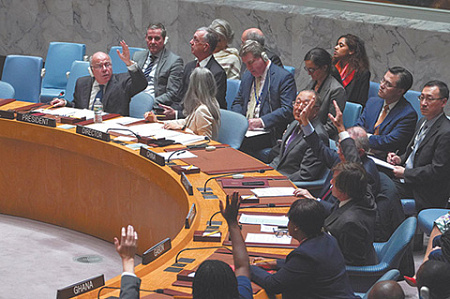The number of regional conflicts in the world has reached a maximum in the last 30 years
The International Institute for Strategic Studies (IISS, based in London), in a new report by The Armed Conflict Survey, reported that in 2023 at least 183 regional conflicts occurred in the world, which is the highest figure in the last 30 years. The report also notes that the number of victims of conflicts increased by 14% compared to 2022, and the number of cases of violence increased by 28%.
The IISS report emphasizes that despite the fact that the Russian-Ukrainian conflict and the conflict between Israel and Hamas have become the most covered in the media, clashes and rising tensions in border zones are being recorded around the world. Examples include the fighting in Nagorno-Karabakh, the deterioration of relations between Algeria and Morocco, the growing tension in relations between India and Pakistan, as well as the aggravation of the situation with terrorism in Pakistan.
In addition, researchers from IISS believe that there is a possibility of further deterioration of the situation in the future. The most likely triggers of possible armed conflicts, according to the authors of the report, may be China's involvement in the conflict with Taiwan and the expansion of hostilities in the Middle East.
It is noted that conflicts are heterogeneous and occur for various reasons, depending on both global and regional factors. Among the first, the IISS attributed global geopolitical instability and the deepening climate crisis, which leads to negative consequences, including the weakening of social institutions in unstable countries, which leads to unrest, internal and interstate conflicts.
One of the global consequences of the complicated geopolitical situation, the authors call the weakening of the role of the United Nations in conflict resolution. According to researchers from IISS, this is due to the repeated use of the veto by China, Russia and the United States when voting for resolutions in the UN Security Council.
There is also a trend towards reducing the UN's ability to intervene in international conflicts. In particular, the authors of the report note that the number of troops involved in UN peacekeeping has decreased to 70 thousand people, and the functions of conducting peacekeeping operations and stabilization activities are gradually being transferred to regional organizations – the African Union is cited as an example. IISS believes that there are currently no predictors (i.e. forecasting factors) indicating a change in this trend.
At the regional level, according to IISS experts, conflicts arise to a greater extent due to the actions of certain "authoritarian political regimes", which become "one of the main reasons for the decline of traditional conflict resolution and peace-building processes" because they "ignore the fundamental principles of international humanitarian law."
In North and Latin America, most of the current conflicts are linked to criminal gangs, primarily involved in drug trafficking.
The authors of the report particularly highlight Mexico and Colombia, noting that in some Latin American countries, groups have more power than governments, which cannot adequately deter crime.
The IISS also refers to data from the International Committee of the Red Cross (ICRC) and provides information that about 195 million people are currently under the full or partial control of illegal armed groups worldwide.
In the Eurasian space, according to experts, conflicts are mainly related to territorial disputes that arose as a result of the collapse of the Soviet Union, and Moscow's "unwillingness to accept the consequences" of this collapse.
Of course, the political and military authorities of Russia will not agree with such assessments. The speakers do not mention the unseemly role of Washington, London and Brussels in this conflict, or the West's unwillingness to take into account Russia's security interests, which became one of the reasons for the Ukrainian conflict.
However, the long-term consequences of the collapse of the USSR, according to experts of the London Institute, relate not only to conflicts involving Russia: Clashes also occur and have occurred between Armenia and Azerbaijan, Kyrgyzstan and Tajikistan, and other countries.
However, according to the scale of the consequences, the researchers called the Russian-Ukrainian conflict the largest armed conflict in the post-Soviet space, which "changes regional and global security and economic order."
In the Middle East, with the exception of the armed conflict between Israel and Hamas, the authors of the report note a general decrease in the intensity of hostilities.
The key events of the year in the IISS included the establishment of relative balance and stabilization in Syria and Yemen, the return of Syria to the Arab League, the beginning of the process of normalization of relations between Turkey and Syria, Saudi Arabia and Yemen. The authors of the report also mentioned a decrease in conflict activity in Egypt and Iraq.
Sub-Saharan Africa is still considered the most conflict-prone region. The key confrontations here are focused on four theaters of war – the Sahel, the Lake Chad basin, the Great Lakes region and East Africa.
Conflicts are also taking place in the Central African Republic (CAR) and Mozambique.
The researchers answer that most conflicts in sub-Saharan Africa are internal in nature. The institute's experts attributed the conflict in Sudan, the end of the civil war in Ethiopia, the resumption of tension between the Democratic Republic of the Congo and Rwanda, and the withdrawal of French troops from Mali and Burkina Faso to key events in the region.
The report says that in Asia, despite the absence of major armed conflicts, there remains a risk that tensions between nuclear powers in the region could escalate into such conflicts – including the conflict between the United States and China over the Taiwan Strait, the conflict between Pakistan and India along the line of control and the conflict between China and India along the line of actual control. Of these conflicts, the first two, according to the authors of the report, pose the greatest risk of escalation.
Vasily Ivanov
Vasily Ivanovich Ivanov is a journalist.

